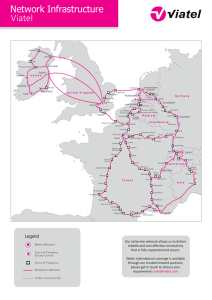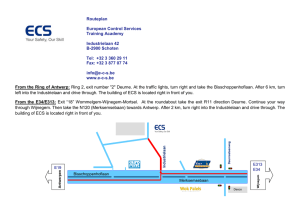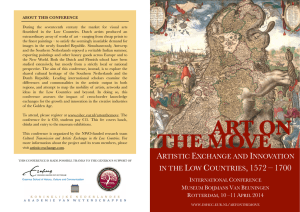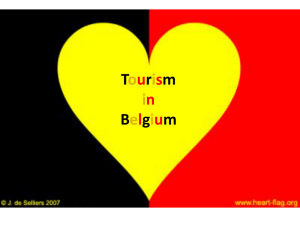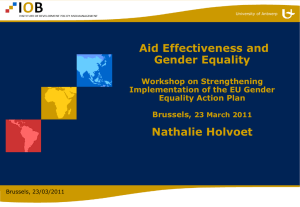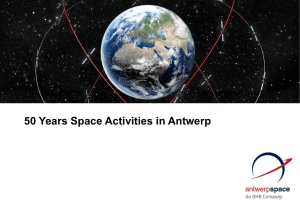New Aid Modalities: Preliminary Remarks
advertisement
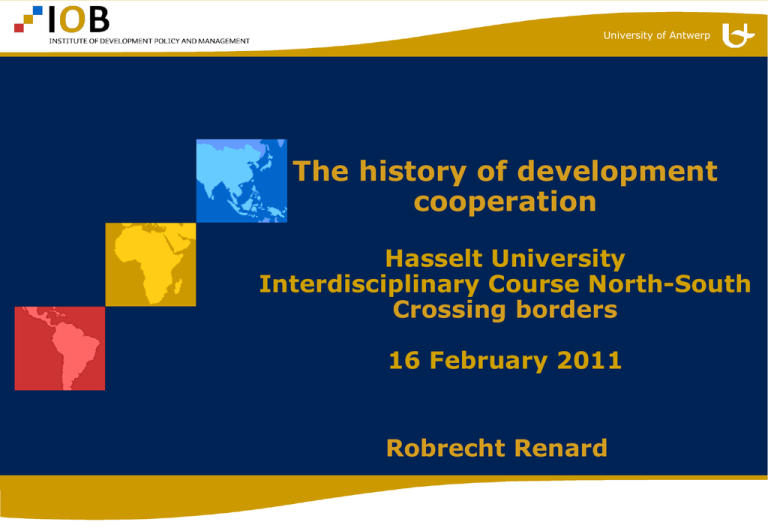
University of Antwerp The history of development cooperation Hasselt University Interdisciplinary Course North-South Crossing borders 16 February 2011 Robrecht Renard University of Antwerp Outline 1. 2. 3. 4. 5. The history of aid: the money The history of aid: the ideas Too many aid deliverers Donor collective action problems Conclusion • slide 2 University of Antwerp ODA in value and as share of GNI 140,000 0.60% 120,000 0.50% 0.40% 80,000 0.30% 60,000 0.20% 40,000 20,000 Stalled promise yet steady increase in volumes Post-colonial adjustment New found optimism? Aid fatigue 0 0.10% 0.00% 2008 2006 2004 2002 2000 1998 1996 share of GNI (right axis) 1994 1992 1990 1988 1986 • slide 3 1984 1982 1980 1978 1976 1974 1972 1970 1968 1966 1964 1962 1960 value (left axis) as percentage of donor GNI billion US $ (2008 constant prices) 100,000 University of Antwerp • slide 4 University of Antwerp • slide 5 University of Antwerp 2. The history of aid: the ideas period preferred aid modality major constraint addressed 19601980 projects - physical capital - human capital bypass 19802000 policy based support - macroeconomic policies bully 2000- budget support - ownership - governance - good donorship engage • slide 6 donor attitude to partner government University of Antwerp The 2005 Paris declaration 1. Ownership (Partner country) 2. Alignment Partner sets the agenda Aligning with partner’s agenda (Donor-Partner) Using partner systems 3. Harmonisation (Donor-Donor) Establishing common arrangements Simplifying procedures Sharing information mutual accountability 7• slide 7 University of Antwerp 3. Too many aid deliverers taxes ODA budget • slide 8 University of Antwerp 3. Too many aid deliverers taxes ODA budget bilateral aid • slide 9 multilateral aid University of Antwerp 3. Too many aid deliverers taxes private donations ODA budget bilateral aid multilateral aid private aid • slide 10 University of Antwerp 3. Too many aid deliverers taxes private donations capital market ODA budget bilateral aid multilateral aid private aid • slide 11 University of Antwerp 3. Too many aid deliverers taxes ODA budget bilateral aid private donations Sources of aid Deliverers of aid private aid • slide 12 capital market multilateral aid University of Antwerp 4. Donor collective action problems • Excessive number of aid deliverers – signals a failure to collaborate – problem aggravated by what follows: • • • • • Principal-agent relationship Samaritan’s dilemma Warm glow effects Missing feedback loops Donors in pursuit of too many goals • slide 14 University of Antwerp Me principal, you agent • Recipient governments often are not pursuing development in their countries – this is not a question of individual morality – but a question of institutional incentives • Aid is more and more being directed towards countries that are badly governed – well-governed countries manage well without aid • Principal-agent theory – requires strong principal who can sanction the agent – but aid sanctions do not hurt the right people • slide 15 University of Antwerp The Samaritan’s Dilemma (J. Buchanan) Recipient High Effort Low Effort No Help 2,2 1,1 Help 4,3 3,4 Samaritan • slide 16 University of Antwerp Samaritan dilemma • If Samaritan is strongly motivated to help, recipient is in the more powerful position, and bad Nash equilibrium results – governments receiving food aid disregard agriculture – villagers do not maintain donor-funded infrastructure • Through a credible strategy of withdrawal (conditionality), a tough Samaritan may avoid the bad equilibrium occurring • Another effective strategy for the smart Samaritan may be to organize aid tournaments (selectivity) • slide 17 University of Antwerp Warm glow • People feel good simply from the act of giving, irrespective of the results obtained – not to be confused with altruism • Although warm glow is a powerful incentive for international solidarity, it can hamper collective action – donors prefer tangible (photographs) and ‘attributable’ results (projects), even if this contributes to donor fragmentation – Northern citizens bypass intermediaries (NGOs) in order to increase the warm glow, even if this reduces effectiveness (transaction costs for delivery and supervision) • slide 18 University of Antwerp Missing feedback loop • Makes public opinion easily manipulated • Gives undue importance to pressure groups – NGOs – universities – private sector (aid tying) • Suggests an increased role for Parliament – provided it is better informed than public opinion – provided it does not only listen to pressure groups • slide 19 University of Antwerp Donors in pursuit of too many goals • Development – technocratic: econonomic growth, health, education,… – political: democracy • Global public goods – – – – climate change distress migration drug trafficking contagious diseases • Non-developmental selfish donor interests – commercial interests (aid tying) – geo-political interests – security interests • slide 20 University of Antwerp Direct effects Donor managed project aid • productivity of the project itself Budget support • general productivity of the public sector • slide 21 University of Antwerp Donor managed project aid Direct effects Indirect effects • productivity of the project itself • know-how transfer • pilot function • transaction costs • weakening of public sector (donor-driven priority setting, poaching of recurrent resources and staff) Budget support • slide 22 • general productivity of the public sector • strengthening of the public sector (TA, policy dialogue, conditionalities) University of Antwerp Donor managed project aid Direct effects Indirect effects • productivity of the project itself • know-how transfer • pilot function • transaction costs • weakening of public sector (donor-driven priority setting, poaching of recurrent resources and staff) Budget support • slide 23 • general productivity of the public sector • strengthening of the public sector (TA, policy dialogue, conditionalities) University of Antwerp Conclusions • High hopes of the aid approach that is advocated in the 2005 Paris Declaration are not being fulfilled – good principles – but naïve about incentives of major actors • But there is no brilliant new aid paradigm looming over the horizon – this is still the best game in town • slide 24 University of Antwerp Thank you robrecht.renard@ua.ac.be http://www.ua.ac.be/dev/bos
